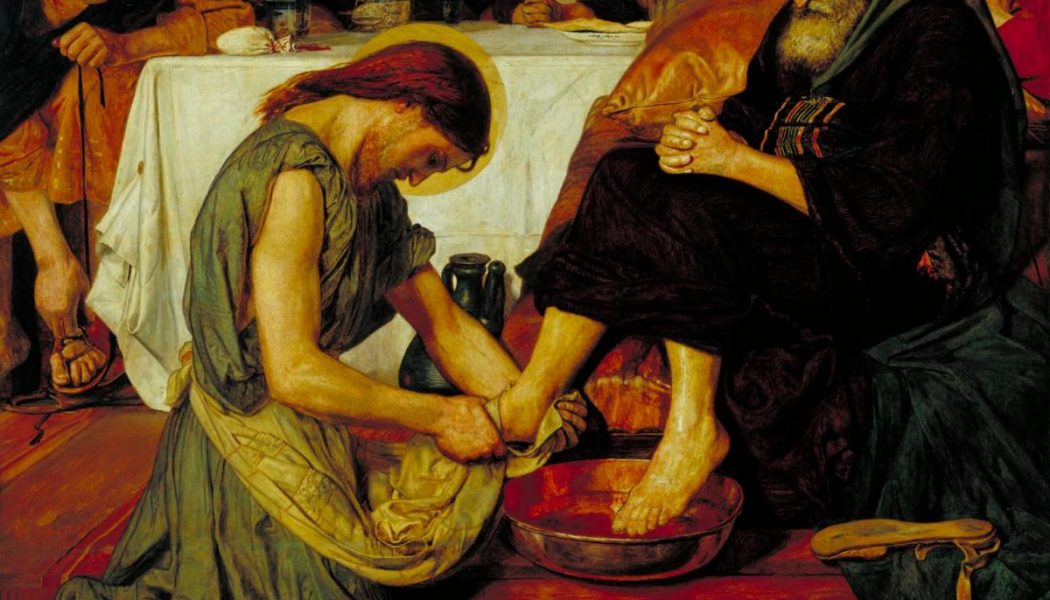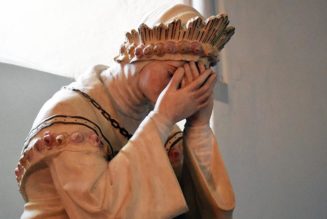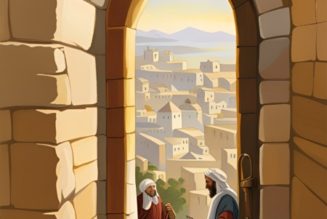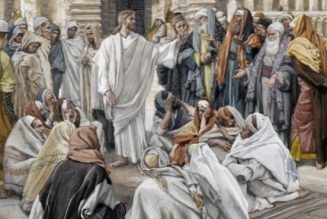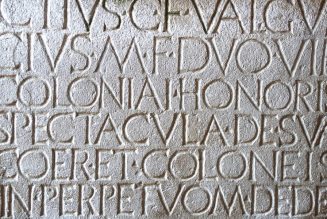
One of the unique features of the Holy Thursday liturgy is the remembrance of Jesus’ act of washing the disciples’ feet. My favorite depiction of this scene has always been the one above by Ford Madox Brown. I think it really captures Peter’s extreme discomfort at having his feet washed by Jesus. I must confess that I find Peter’s face, which depicts well his begrudging acceptance of the act, a bit humorous.
But why was he so uncomfortable? Actually, there is a lot more going on here than it first may seem. Knowing the Greek here really helps. Indeed, had Peter fully realized what Jesus was calling him into, he might have protested even more than he did. Let me explain.
The account is found in John 13:
Now before the feast of the Passover, when Jesus knew that his hour had come that he would depart from this world to the Father. And having loved his own in the world, he loved them to the end. 2 And as supper was happening,the devil having already put into the heart of Judas Iscariot, Simon’s son, to betray him, 3 Jesus knowing that the Father had given all things into his hands, and that he had come forth from God, and was going to God, 4 he rose up from the supper, and laid down [tithēmi] his garments; and took a towel, and girded it around [diazōnnumi] himself. 5 Then he poured water into a basin, and began to wash the disciples’ feet, and to wipe them with the towel with which he was girded. 6 Then he came to Simon Peter who said to him, “Lord, are you going to wash my feet?” 7 Jesus answered and said to him, “What I do do now you do know understand; but you will understand after these things.” 8 Peter sad to him, “You shall never wash my feet.” Jesus answered him, “If I do not wash you, you have no part with me. 9 Simon Peter said to him, “Lord, not my feet only, but also my hands and my head.” 10 Jesus said to him, “He that is washed need does not need to wash except his feet, but isclean completely: and you are clean, but not all of you.” 11 For he knew the one who would betray him, therefore, he said, “Not all of you are clean.”
John 13:1-11; my translation
Jesus goes on to explain that he has given his disciples an example to follow, explaining that the “servants are not greater than their master” (John 13:16).
The imagery of “servants” (or “slaves”–the Greek term has both connotations) is important here. As many have observed, foot washing was a menial task that was often performed by servants. Roads were not only dusty, but were also known to be filled with animal excrement (see Craig Keener, Commentary on John, [Peabody: Hendrickson, 2009], 2:1535). For the host of the meal to wash the feet of others himself was an astounding act of humility. And that is the precise point of the story: Jesus shows himself to be willing to do the unthinkable.
However, if one is carefully following the narrative of John, it should be no surprise that Jesus takes on the role of a servant. Immediately prior to John 13, Jesus withdraws from the crowds. The evangelist writes,
But though he had done manymiracles before them, they did not believe in him, 38 that the word of Isaiah the prophet might be fulfilled, who said, “Lord, who has believed our report? And to whom has the arm of the Lord been revealed? [Isa 53:1]”
John 13:37-38; my translation
The quotation from Isaiah is crucially important for understanding what follows in John’s Gospel. The line is taken from the famous “Suffering Servant” passage of Isaiah 53, which goes on to explain:
He was despised and rejected by men, a man of sorrows and acquainted with grief. . . he was despised, and we esteemed him not. 4 Surely he has borne our griefs and carried our sorrows; yet we esteemed him stricken, smitten by God, and afflicted. 5 But he was wounded for our transgressions; he was crushed for our iniquities; upon him was the chastisement that brought us peace, and with his wounds we are healed.
Isaiah 53:3, 4-5; my translation
By washing the disciples feet, Jesus anticipates how he will lay down his life.
In fact, the Greek terms used by John to describe Jesus’ actions also point to this. First, Jesus “laid down [tithēmi] his garments; and took a towel” (John 13:4). After he completes the foot washing, we read, “So after he had washed heir feet, and had taken up [lambanō] his garments. . .” (John 13:12).
The verbs for “laying down” (tithēmi) and “taking up” (lambanō) evoke a saying of Jesus that occurs earlier in the Gospel of John, a saying which clearly anticipates Jesus’ death:
“Therefore my Father loves me because I lay down [tithēmi] my life, that I might take it up [lambanō] again.”
John 10:17; my translation
Jesus’ action, then, of laying down his garments signifies his coming act of laying down his life. Likewise, in taking up his garments Jesus anticipates his resurrection.
Of course, John goes on to tell us why Jesus does this:
A new commandment I give to you, that you love one another; just as I have loved you, that you also love one another. 35 By this all shall know that you are my disciples, if you have love among one another.
John 13:34-35; my translation
Jesus’ act of washing the disciples’ feet is meant to foreshadow his act laying down his life, which is described as an act of love.
Simon Peter said to him, “Lord, where are you going?” Jesus answered him, “Where I am going you are not able to follow me now, but you shall follow me afterwards.” 37 Peter said to him, “Lord, why am I not able to follow you now? I will lay down [tithēmi] my life for you.” 38 Jesus answered him, “Will you lay down [tithēmi] your life for me? Amen, amen, I say unto you, “The rooster shall not crow until you have denied me three times.”
John 13:36-38; my translation
Peter professes to do what Jesus asks – to exhibit self-giving love, yet Jesus announces that he will fail.
I should not fail to mention that this language of “laying down” one’s life is underscored again in John 15. Here Jesus uses the verb the evangelist uses for Christ’s act of “laying down” his garments in the foot washing:
“Greater love has no man than this, that a man lay down [tithēmi] his life for his friends” (John 15:13).
John 15:13; my translation
In John, of course, the man who lays down his life for his friends is none other than Jesus. Indeed, Jesus lays down his life for those whom he knows will fail to reciprocate.
And that is the key lesson of the foot washing episode: Jesus’ disciples are called to enter into the life-giving love of Jesus. We are not called to simply wash feet, but to lay down our lives in love. And we must show that kind of love even to those who would not necessarily return it. By this, we are show that we are his disciples.
Had Peter known all of this, I suspect he would have felt even more discomfort. Yet at the end of John Jesus announces that Peter will one day learn to surrender his own life:
Amen, amen, I say to you, “When you were young, you girded [zōnnuō] yourself, and walked where ever you wanted: but when you are old, you shalt stretch forth your hands, and another shall gird [zōnnumi] you, and carry you where you do not want to go.” 19 This he spoke, signifying by what kind of death death he would glorify God.”
John 21:18-19
Peter would one day learn to give his life in love for Christ (cf. John 21:15-17). Note also the language of “girding” (zōnnuō, zōnnumi), which evokes the imagery of the foot washing, in which Jesus took the towel and “girded it around” (diazōnnumi) himself.
Prior to the giving of the Spirit, the Paraclete, Peter was unable to follow Jesus and love the Lord as he had been called to love. However, that would change. So too, we can, by the Spirit, learn to love as Jesus did–in unthinkable self-sacrificing ways. That is the prayer of the Church today.
Have a blessed Holy Thursday!
